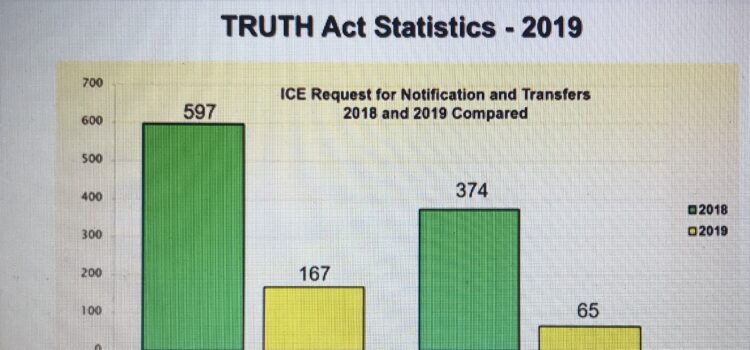
Data released by the Kern County Sheriff’s Office at Kern County’s third annual TRUTH Act Forum, held Monday evening, showed a significant decrease in the number of transfers to Immigration Customs Enforcement and release notification requests.
KCSO Chief James Morrison said 65 inmates were transferred to ICE from KCSO jails in 2019, a significant drop from the 374 in 2018. ICE also made 167 requests for notification of release, a drastic drop from the 597 made the year prior.
Of the 167 individuals who ICE requested notifications, 155 were Hispanic and 160 were male. The average age of the person was 35 years.
However, many immigrant rights advocates and community members expressed concern and confusion regarding the numbers presented by KCSO.
Rosa Lopez, the community engagement and policy advocate for Kern County’s ACLU office, asked for an explanation from the Sheriff’s office regarding the significant drop in transfers and requests. She said in 2018, KCSO transferred individuals who had not been convicted into ICE custody, which is a violation of the TRUTH Act.
“We are concerned such transfers have continued to play out,” said Lopez. “(We are concerned) the sheriff’s office no longer labels them as such and is not required to report them.”
And although 65 inmates were transferred in 2019, only 28 were reported to the California Department of Justice, according to Ambar Tovar, the directing attorney for the UFW Foundation.
Lopez also said about 24 percent of the population in detention centers are transfers from county jails.
“Figuring out who is telling the truth…is quite complicated and unrealistic,” Board chairwoman Leticia Perez said at the forum. “Getting to the truth is quite complicated, and this hearing is not suited for that.”
However, Morrison said KCSO is open to holding a meeting with Lopez to address any confusion and answer any questions.
“We will work with them and on the other questions,” said Morrison. “Whether we have another forum or not, we still plan on working with them.”
Other residents also shared concern and frustration with the nature of the forum.
Prior to the forum, Lopez urged the Board of Supervisors to postpone the meeting to a later date to allow more notice to community members and to allow for more public participation.
Others agreed.
“I will have to agree with the other public speakers,” said Jennifer Fair. “This meeting did come as a bit of a surprise.”
However, the Board of Supervisors said it posted the notice of the forum with 30 days of notice, which is required by law.
Morrison also made note in a presentation of what KCSO does not do, including holding inmates past the date of their release; delaying release; asking for immigration status; providing ICE access to KCSO databases; enforcing federal immigration law; deporting individuals; and participating in immigration sweeps.
Morrison said KCSO does, however, notify inmates that ICE has requested notification of their release; notify inmates of their rights regarding ICE interviews; make release notification if there are qualifying charges; cooperate with ICE within the the law.
A public forum is a requirement of the California Transparent Review of Unjust Transfers and Holds (TRUTH) Act, passed into law in September of 2016.
The law provides vital “know your rights” information to immigrants who are in ICE custody and brings transparency to local law enforcement participation in federal immigration enforcement. It also requires local law enforcement to provide a written consent form to explain the purpose of the interview, that it is voluntary and that the individual may decline the interview.
The law also ensures that if local law enforcement agencies provide ICE with notifications of an individual’s release date and time, then the agency must also provide the same notification to the individual in custody and their attorney, according to the bill. The law requires local police agencies to collect information and data when ICE requests transfer holds and interviews with individuals in custody.